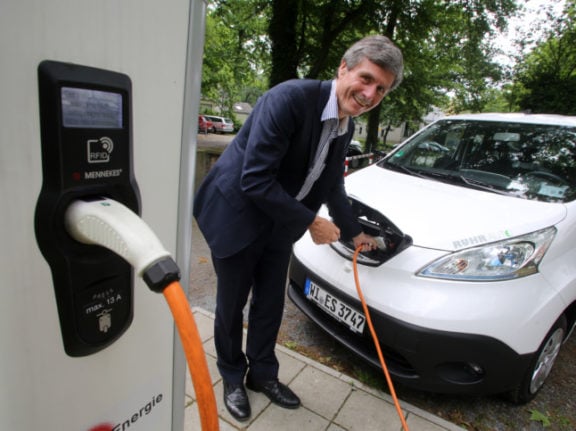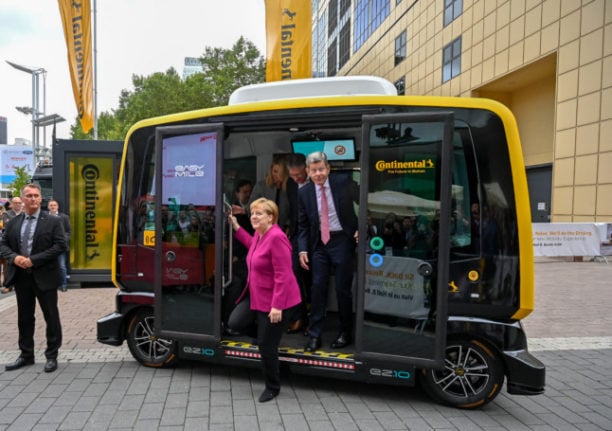But the biennial celebration of all things auto-related is mired in controversy this year as Germany struggles to adapt its flagship industry to the electric and digital revolution.
Merkel, who is quitting politics after an election on September 26th, has been a regular at the show over her 16 years in power – even earning the sobriquet the “car chancellor” for her efforts to shield German carmakers from tougher EU pollution rules.
The German leader will give a speech when the fair opens to trade visitors on Tuesday in Munich, a new location as part of efforts to rebrand itself as a “mobility fair” with a spotlight on electric cars.
But there is little chance of the chancellor herself arriving in an electric vehicle, since they make up only 2.4 percent of the government’s 25,000-strong fleet, according to official figures from January.
The figure rises to 5.6 percent when taking into account hybrids and cars that run on clean fuels.
Even so, it is a stark reflection of the blind spots in state support for the German automotive industry, which has received billions of euros in funding in recent years but without any meaningful focus on clean mobility.
‘Depressing and incomprehensible’
The 2015 “dieselgate” scandal spelled the beginning of the end for diesel. That was when Germany’s biggest carmaker Volkswagen admitted to fitting 11 million vehicles with illegal emissions-cheating devices.
Until then, Diesel was favoured by German and other governments as an efficient and more environmentally friendly alternative to gasoline.
Merkel expressed anger at the scandal.
But in Brussels, her government sought to slow the shift to e-mobility by watering down toughened emissions regulations that German carmakers would struggle to comply with, the Sueddeutsche Zeitung said.
On the eve of Merkel’s visit, the boss of Volkswagen even blamed her government for slowing down the electric revolution by incentivising diesel engines even after his company was seeking to make the switch following the emissions scandal.
READ ALSO: German climate groups plan legal action against car giants
“A car company cannot do this transition (alone) because you need the right environment,” Volkswagen chief executive Herbert Diess told AFP in an interview. “If you keep diesel cheap… nobody will buy an electric car, it’s impossible,” he said.
Ferdinand Dudenhoeffer, director of the Center for Automotive Research at the University of Duisburg-Essen, called the government’s diesel strategy “depressing and incomprehensible”.

Ferdinand Dudenhoeffer, an expert in the automotive sector, thinks Merkel’s strategy for the car industry is “depressing and incomprehensible”. Photo: picture alliance/dpa | Roland Weihrauch
“The state fuelled a diesel boom through tax breaks, and now diesel passenger cars are practically unsellable,” he told AFP.
“Scrappage schemes, incentives to buy electric cars, subsidies for battery production, aid for recycling, short-time working allowances – this has been the strategy for 16 years. This alleviates short-term economic problems, but does not build a new structure,” Dudenhoeffer said.
“The government has had to balance short-term economic concerns with the interests of industry and the unions,” he said.
READ ALSO: German public transport slammed as ‘failure’ as half of users switch to car
Merkel’s government has always treaded gingerly because of the 800,000 jobs at stake in the industry.
But the Sueddeutsche Zeitung lamented in August that “with her overly generous attitude towards the car industry, the chancellor has helped neither the companies nor the country in the medium term”.
“Valuable years have been lost in the battle to phase out the combustion engine,” it said.
Existential crisis
With the momentum for greener mobility growing, and with tougher anti-pollution guidelines in place, Germany’s car manufacturers are now no longer able to put off the inevitable.
The decline of the combustion engine is proving to be an existential crisis for the car industry, which accounts for more than 12 percent of jobs in the industrial sector in Germany.
READ ALSO: Is Berlin set to become car-free in the next few years?
In late 2019, Audi said it was planning to cut 9,500 jobs in Germany by 2025, while Daimler announced it would cut 10,000.
While Germany’s large manufacturers have the resources to weather the transition, the ecosystem of equipment manufacturers and smaller businesses in the supply chain may not be so resilient.
By Sophie Makris



 Please whitelist us to continue reading.
Please whitelist us to continue reading.
Member comments